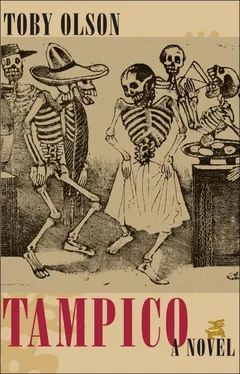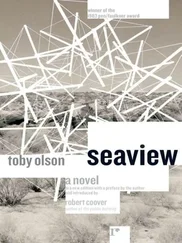And you might notice too a hint of the commercial quality of the fine main streets of the Zona Rosa here and how these are in contrast to those invisible byways behind it where the Mexicans live. The woman finds the dog in a dark alley and the concrete is cracked. But the alley is between two shops, one a depository of intellect, the other of art, those two crucial elements of the survival of a culture, the real Mexico here, el corazón of the healthy beating under the drumming of commerce.
And in the reversal the story has not quite ended though the point has been made, because the doctor was wrong. The thing left on the examination table was no rat at all, but a chihuahua of mixed strain, one who had drunk of pure mother’s milk and was not dead but was rising up in the night, his blood cleansed by that milk in the way Mexico might be cleansed, returning to the children of the Indian mother. For the pure chihuahua is an Indian, one who came down from those mountains behind us where I came from. He’s preening and turning in slow circles, his nails clicking on the slick metal, free now of the attentions of woman and doctor and the manipulations that might come from them. It’s dark in the room, and the dog shakes his bum leg and stretches, his eyes blinking, then opening wide as small saucers as he stares down over the table’s edge. He licks his lips. Then he jumps into the void of blackness below.
Her feet hit, her pads thumping on the hardwood of this floor. There she is now, returned to the female through her mother’s milk. In our candles’ light she searches the room for something she might never find. See her? She’s passing low over the carpet there. She looks like a piece of fruit. I think she must be the Indian phoenix that could rise again, redeeming a rodent and the meaning of a hue. This is why I have named my chihuahua Rata and why I have colored her yellow.
And yet this is not the story I have set out to tell, but one that begins on a windy morning in which Chepa had awakened me with the long smooth muscles of her small body and with the sun and we were active in a cool breeze on our bed. She had a way of holding me with her legs, her voice like a strange urging instrument as she fingered the base of my spine. But that is yet another story, and private, and inexpressible even now in this mind of an old man as he remembers.
Chepa stood in swirls of dust as I fired up the de Havilland. I could see the pink Estrella, her long coat feathering in the wind and brightening into cotton candy as the last shafts of sun were swallowed in the high clouds. She was trotting low, her muzzle close to the ground, heading back up the porch steps to join Don Lupe and Rata in the doorway. My goggles were sandblown and the house shimmered and I could feel grit at the cups’ edges. I glanced ahead, under the upper wing, and could see the planters rocking at the runway’s end through the prop’s whir. I looked down at Chepa. Her hand was guarding the side of her face and wind blew her loose dress against her body, revealing those large breasts that had not known mother’s milk, though I had sucked for it. She grinned up at me and I kissed my lips down at her. She wiggled as she waved me away. Our beautiful routine.
Once into the sky, the de Havilland was severely buffeted. My wings were rocking, my tail pushed to the side, and I had to cram my scarf down into the neck of my jacket to keep it from blowing across my face. Wind whistled along the leather of my flight cap where it hugged my cheek. So I took the plane higher, climbing until I was just under the clouds, no more than twenty yards below them. They were thick and almost black, and they raced over me, coming in from the sea. I felt the plane’s nose tip up toward them and had to look away, disoriented.
I was flying very high, and soon I could see the city of Tampico far below, and beyond it, ten miles off, the Gulf of Mexico. I could see the tiny shapes of a few tankers. They seemed still and untroubled by storm, but there were flashes of white in the dark blanket of water they rested upon, waves surely, and the sky was a roiling black wall where it joined the sea at horizon.
I had to fight the stick getting the plane down, and in my landing the wheels bounced and squeaked, then did it again. I parked the craft, chocked and tied it down, then struggled in the wind across the concrete to the Texas Oil office, glancing back once to see the de Havilland dancing at its moorings, its wings vibrating in gusts. I knew there’d be no flights that day, and I was already figuring how I might get back to Chepa as I opened the office door and saw Joaquín sitting at the large desk where the mail and parts chits were distributed. He was the only one there, and he looked up from the documents he’d been reading and smiled.
“¿ Qué tal, hombre?”
“Well,” I said. “It’s a real pisser out there.”
“Ah, yes,” he said, and got up from the table. “A good storm. No sky riding today. How, then, is Chepa?”
“Fine,” I said. “Quite good.”
“Well, that’s good,” he said.
He’d risen in formality, and once I was in the chair across from him he sat down again. He was dressed up, in a fine cotton suit, and he wore a tie and his hair had been carefully combed and oiled. I’d already given up on the idea of getting back to Chepa, not in this weather, so when he indicated, somewhat obscurely and delicately, that he could use my help, I said fine.
“But why the suit?”
“That’s it!” Joaquín answered, lifting his hands from the papers. “It’s a meeting in Chorreras. With General Corzo.”
He must have seen something in my face, for he paused, his hands still in the air.
“Can this be a good idea?” I said. “My being there?”
“Oh, yes,” he said. “That’s right. A very good idea in fact.” He’d gathered up the papers and was rising again. “Come now. I’ll tell you about it on our way.”
Chorreras was located on the Gulf, near where the Panuco River emptied into it. It had once been a thriving fishing village, much like so many others along the sea’s gentle curve of shoreline, but the arrival of oil interests had changed things. The construction of sea terminals, spills from the tankers, both had killed fishing, and with pipelines had come a need for workers and administrators. Chorreras looked much the same as it always had, but now its ramshackled stucco buildings contained offices and apartments. Some fishermen and their families remained still, and there was an old church and a village hall too, but most of the population was foreign — American, French and British — and there were no more than fifty Mexican workers at the few national terminals, like Corona and Aguila.
The driver moved the company car slowly through the busy streets of Tampico, heading for Laguna de Carpentero and the small-gauge railroad that would take us along the bank of the Panuco and out to the sea. I sat beside Joaquín in the backseat, sniffing his subtle cologne and listening to what he had to say. Outside the car window, the streets and the wooden sidewalks were crowded with pedestrians. It was the end of October and the city had been hot, still and humid for weeks. But the cool, stormy weather had cleansed and freshened the air, blowing out the acrid refinery smoke, and the people were taking a windy pleasure in it, standing before shops, pausing to look up into the cloudy sky, their hair flicking at their ears and napes, fingers holding the brims of their hats.
We passed the mouths of crowded side streets that were decked out for fiesta, ribbons and banners flapping over makeshift archways, women turning in traditional costume under them. We came upon the Ciudad de Pekín, where I’d eaten my first Chinese food with Chepa, and saw a small orchestra of men in pigtails playing strange-looking instruments, the refined and simple sounds momentarily everything in our ears, then disappearing suddenly as we moved by. We passed a bakery, a table of small white candy bones and skulls on the sidewalk in front of it, and a man dressed like a skeleton staggered in half-dancing drunkenness into the street so that our driver had to jerk at the wheel to avoid hitting him.
Читать дальше












